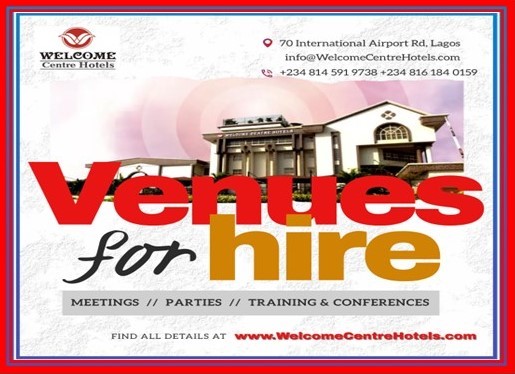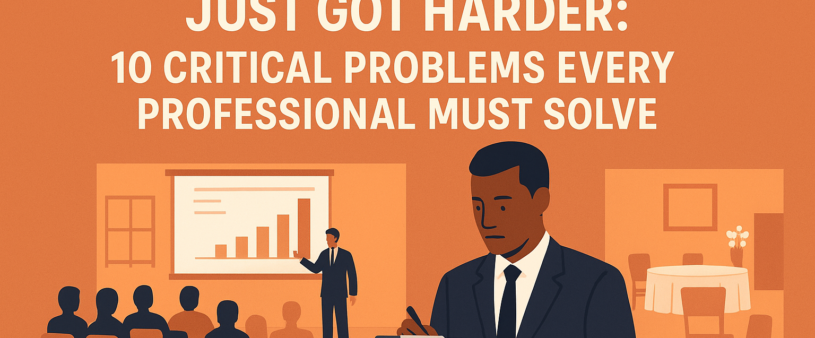The events industry in Nigeria is evolving rapidly. Event planners, conference organizers, and office administrators face unprecedented pressures that demand innovative solutions. As a venue provider, we witness these challenges firsthand and continuously adapt our services to help planners succeed. Here are 10 current challenges facing event professionals, with strategic solutions from a venue provider’s perspective:
1. Post-COVID Capacity and Safety Protocol Management In our post-COVID world, event planners navigate complex attendance protocols amid ongoing health concerns and varying corporate policies on in-person gatherings. Smart planners stay updated with state event attendance guidelines and partner with venues offering flexible capacity options, innovative hybrid setups with seamless livestreaming capabilities, and transparent sanitization protocols. Choose venues that share your professionalism and can quickly reconfigure spaces while providing detailed safety documentation to reassure organizers and attendees. Review and book venues that support events with visible fire exits, medical response access, and documented safety certifications.
2. Budget Constraints and Cost Inflation Corporate budgets have tightened while venue costs, catering, and AV equipment have increased significantly. Inflation and currency fluctuations make budget adherence increasingly difficult. Consider venues offering all-inclusive packages that eliminate hidden fees and provide predictable pricing. Flexible venue packages bundling catering, AV, and furniture help clients save and predict costs upfront, reducing overhead and administrative burden. All-in-one hall and hotel service providers cut costs and reduce logistical challenges. Form strategic partnerships with venues and vendors to secure discounted rates and loyalty benefits, growing your margins while easing client pressure.
3. Technology Integration and AV Complexity Modern events require sophisticated tech setups for hybrid attendance, interactive presentations, and seamless connectivity. Forward-thinking planners select venues with built-in high-speed internet infrastructure, in-house AV support teams, and pre-installed streaming and recording equipment. Choose venues offering tech rehearsals and backup systems to prevent technical failures during critical presentations. Leading venues now invest in built-in high-speed internet, backup power, professional projectors, and on-site IT staff. Just as brides have makeup artists on standby, event planners should have IT support readily available.
“If Plan A didn’t work the alphabet has 25 more letters. Stay cool.”
Unknown
4. Attendee Engagement and Hybrid Event Management Keeping both in-person and virtual attendees engaged simultaneously presents significant challenges. Smart event organizers work with venues providing dedicated streaming setups, multiple camera angles, and interactive platforms enabling remote participants to ask questions and network effectively. Venues offering breakout spaces for hybrid networking sessions and specialized staff to manage virtual components become essential partners. Flexible room partitions and scalable catering menus allow events to expand or contract smoothly based on attendance.
5. Last-Minute Changes and Flexibility Demands Corporate events face constant changes in attendance, scheduling, and requirements. Successful planners partner with venues offering flexible cancellation policies, modular space configurations, and rapid scaling capabilities. Look for venues with multiple on-site room options and experienced management teams handling rapid adjustments without penalty fees. All venues differ—understand your options should plans change leading up to the event. Keep your venue vendor informed and updated on challenges so they can quickly pivot in your favor when required.
6. Catering Restrictions and Dietary Accommodations Managing diverse dietary needs, allergies, and cultural requirements has become increasingly complex. Experienced planners work with venues having versatile catering partners, clear ingredient labeling, and capabilities to handle multiple dietary restrictions simultaneously. Choose venues providing separate preparation areas for allergen-free options and offering diverse menu choices including plant-based, halal, and kosher alternatives.
7. Sustainability and Corporate Social Responsibility Pressure Companies demand eco-friendly events aligning with sustainability goals. Progressive planners select venues with green certifications, waste reduction programs, and renewable energy sources. Look for venues offering digital signage instead of printed materials, sustainable catering options, recycling programs, and carbon offset partnerships to meet corporate environmental commitments. Reusable décor, energy-efficient lighting, recycling options, and solar backup power demonstrate genuine green commitment.
8. Staff Shortages and Service Quality Concerns The hospitality industry faces significant staffing challenges affecting service quality and availability. Smart planners book venues well in advance, choosing established venues with stable, experienced teams. Partner with venues investing in staff training, offering competitive compensation to retain quality employees, and maintaining backup staffing plans for critical events. Your event isn’t just about booking space—it’s about choosing partners with experience who can help navigate complex logistics. Dealing separately with caterers, decorators, AV teams, and logistics creates confusion. Choose a one-stop shop where professionals coordinate various service providers.
Just because you have planned something doesn’t mean it is going to happen
Jung Lee, Celebrity Event Planner/Producer – (From Whova Blog, July 22, 2024)
9. Competition for Prime Dates and Venues Popular venues and desirable dates book quickly, especially for recurring corporate events. Successful planners secure venues 6-12 months in advance, establish preferred partnerships with reliable venues, and consider alternative dates or venues offering similar value. Build relationships with venue managers who provide insider knowledge about availability and last-minute openings.
10. Traffic and Accessibility Challenges Lagos traffic and poor navigation frustrate attendees significantly. Choose venues in central locations near airports, with shuttle partnerships and clear signage, plus digital map integration to reduce attendee stress. Consider not just hall size but also venue access, off-road parking, signage, and online presence. If you book a venue without checking location and accessibility on map apps like Google Maps, you haven’t exercised due diligence in today’s digital age.
Key Venue Selection Strategy The most successful event planners build strategic partnerships with 3-5 reliable venues that understand their specific needs, offer consistent service quality, and provide flexibility required in today’s dynamic corporate environment. These partnerships often result in preferred pricing, priority booking, and customized service packages that help planners overcome industry challenges while delivering exceptional experiences for corporate clients. Event planners juggle many moving parts, but strong venue partnerships make the crucial difference. By anticipating these challenges and providing built-in solutions, venues help transform stressful events into professional, memorable experiences that exceed client expectations.




Leave a Reply